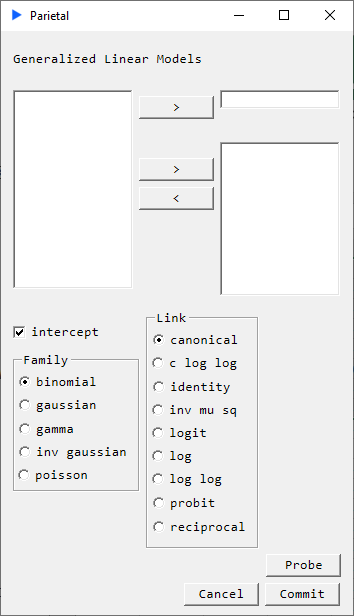Generalized Linear Models
In cases where the dependent variable follows a distribution that is different from a normal distribution, we have a technique that generalizes OLS principles. This is known as the generalized linear model (GLM). If the target distribution falls under the *exponential family* of distributions, it uses a link function as a bridge to map the regression. Typically the method of iteratively reweighted least squares is used to fit the model due to quick convergence properties.
- Families
- Binomial
- Gaussian
- Gamma
- Inverse Gaussian
- Poisson
- Links
- Canonical
- C Log Log
- Identity
- Inverse MuSq
- Logit
- Log
- Log Log
- Probit
- Reciprocal

Description
For a GLM, three pieces are needed:
- A distribution belonging to the exponential family
- A linear predictor
- A link function that maps the linear predictor to the target distribution
The exponential family of distributions are ones whose density functions can be expressed in the form of:
We implement the following families:
- Binomial
- Gaussian
- Gamma
- Inverse Gaussian
- Poisson
We describe the linear predictor as.
Then we define a link function that maps this linear predictor to mean of the target distribution.
We implement the following links:
Canonical (will choose the default link for the chosen Family)
Family: Gaussian → Link: Identity
Family: Binomial → Link: Logit
Family: Poisson → Link: Log
Family: Gamma → Link: Reciprocal
Family: Inv Gaussian → Link: Inverse Mu Squared
C Log Log
Identity
Inverse Mu Squared
Logit
Log
LogLog
Probit
Reciprocal
Returns
- coefficient
- standard error
- t-statisitc
- p-value
- convergence
- fisher iterations
- residual null
- residual deviance